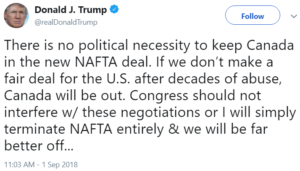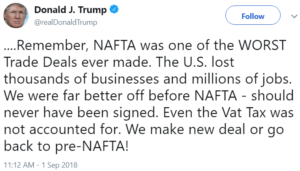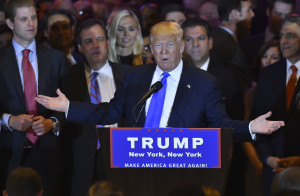A pair of tweets by President Donald Trump on September 1 would encapsulate what’s wrong with his understanding of the world, if it were possible to squeeze it in a capsule. The tweets dealt with the current renegotiation of NAFTA (the North American Free Trade Agreement), which could exclude Canada or flounder altogether. At nine minutes from one another, they read:
There is no political necessity to keep Canada in the new NAFTA deal. If we don’t make a fair deal for the U.S. after decades of abuse, Canada will be out. Congress should not interfere w/ these negotiations or I will simply terminate NAFTA entirely & we will be far better off…
….Remember, NAFTA was one of the WORST Trade Deals ever made. The U.S. lost thousands of businesses and millions of jobs. We were far better off before NAFTA – should never have been signed. Even the Vat Tax was not accounted for. We make new deal or go back to pre-NAFTA!
The “fair deal for the U.S.” is typical politico-speak. The expression “fair deal” reached its apex under President Harry Truman (if the Google Books Ngram Viewer is any indication), although it seems to have been also very popular in the Progressive Era. It has been re-used by Barack Obama (“workers fighting for a fair deal,” for example) and by Bernie Sanders among others. It must not be forgotten that what constitutes “fairness” in “fair” trade is determined by politicos and bureaucrats responding mainly to special producer interests. On a philosophical level, they passionately don’t agree among themselves what fairness is.
As for “the U.S.,” it is not, in fact, a large individual or a homogeneous collective. Any “fair deal” for some American producers will be paid for by some American consumers in higher prices.
Other elements of Trump’s September 1 tweets may lie even farther on the spectrum of political lies, exaggerations, or delusions.


One is the statement that “NAFTA was one of the WORST Trade Deals ever made.” Trump sometimes tries to appear–and is believed by some of his supporters to be–as much a free trader as a protectionist (A and non-A) when he claims he wants zero tariff. Now, zero tariff is basically what NAFTA achieved in most of North American trade. It is true that there were exceptions in some sectors—for example, milk, eggs, and poultry products, which cannot be freely imported into Canada, or maritime shipping services, which cannot be imported into the United States. But if one believes that “free trade” treaties are necessary for free trade, the old NAFTA was in many ways a model.
Another example of extreme politico-talk in the tweets of September 1 is found in the claim that “the U.S. lost … millions of jobs” because of NAFTA. Between January 1, 1994, when NAFTA came into force, and July 2018, the number of private jobs in America increased by 33.3 million. This job growth of 36% happened despite the worst recession since the Great Depression. Moreover, if “the U.S.” had lost millions of jobs, one wonders where these jobs would now be in an economy at, or close to, full employment. Except for structural, government-created obstacles such as minimum wages, the 6.3 million currently unemployed mainly reflect frictional unemployment (being in-between two jobs). The extent of frictional unemployment in a dynamic economy is illustrated by the fact that some five million Americans change jobs every month.
Still another example of misleading statement (to say the least) is the idea that the value-added tax in Canada and Mexico were “not accounted for” in NAFTA. Protectionists in the Trump administration believe that a VAT plays the role of a tariff despite its being paid by consumers at the same rate whether they buy foreign or domestic goods. This belief seems to show a glaring ignorance of how a VAT works.
Last but not least is Trump’s threat to Congress that it “should not interfere w/ these negotiations or I will simply terminate NAFTA entirely & we will be far better off…” A threat is a commitment to impose a cost, not to confer a benefit. But Trump is threatening what he believes is a benefit. What he is telling Congress is something like “if you prevent me from implementing a new NAFTA, I will do even better by simply abolishing it.” In other words, if you prevent me from doing what’s good for Americans, I will do something that will be even better for them. Even if one grants all protectionist claims, the logic of this threat is strange.
There are currently three alternatives on the table: (1) the continuation of NAFTA in more or less its present form; (2) major protectionist changes such as the exclusion of Canada; (3) the termination of the treaty. Since Trump appears to be legally empowered to do #3, and believes he can do so, why would he try to do #2, and threaten to do #3 only if Congress pushes for #1? Perhaps because he could then blame Congress for the damage, including to his base of “deplorables” who buy inexpensive imported goods.
So much for political rationality, which, according to many behavioral economists, is supposed to compensate for private cognitive limitations!
Is all this also related to an anti-Enlightenment rejection of logic and reason, on par with the postmodernist and “snowflake” return to non-rationality and emotions? If so, the current president would not be really different from his worst predecessors and competitors, including Hillary Clinton; he would be their heir, in a rawer incarnation.


READER COMMENTS
Craig Walenta
Sep 4 2018 at 4:38pm
Its designed to be seen by the Canadians.
Mark Brady
Sep 4 2018 at 7:50pm
“Still another example of misleading statement (to say the least) is the idea that the value-added tax in Canada and Mexico were “not accounted for” in NAFTA. Protectionists in the Trump administration believe that a VAT plays the role of a tariff despite its being paid by consumers at the same rate whether they buy foreign or domestic goods. This belief seems to show a glaring ignorance of how a VAT works.”
Trump’s argument re VAT is not as absurd as it may seem. As you know, VAT is rebated in respect of exports. This means that producers in a country exporting goods subject to VAT in the domestic market can sell those exports for less than comparable producers in another country (e.g., the United States) that does not levy VAT but mandates other taxes that are not rebated (and whose burdens are borne by those producers). I appreciate that the goods of both producers are subject to VAT or a final sales tax in any country that levies such a tax.
dede
Sep 4 2018 at 9:36pm
“This means that producers in a country exporting goods subject to VAT in the domestic market can sell those exports for less than comparable producers in another country”
Are you blaming foreigners to not impose taxes on their producers because the US do?
VAT is always an internal tax and, as far as I know, there is not country that imposes VAT on their exports : that would be equivalent to tarrifs on exports and, as these morons are all more or less mercantilists, they think tarrifs on imports make sense so they logically conclude (for once) that tarrifs on exports do not make sense.
John Bowman
Sep 5 2018 at 5:20am
’… VAT is rebated on exports’.
This is not so. VAT is an end-user tax, not a tax on the producer/supplier, charged at the point of sale on a good the benefit thereof being derived within the tax jurisdiction.
Condidering the UK for example: a good with a sales price of £100 will be sold to a UK consumer for £100 + VAT @ 20% = £120.
The same good exported to the USA would be billed at £100 + 0% VAT = £100.
If a USA citizen, a tourist, buys that good in a London store, they will pay £100 + VAT = £120 because there is no way of knowing whether they will enjoy the benefit of the good in the UK or not. However at the airport on departure, the US tourist can go to the Customs office and present the goods, the shop receipt, their passport and boarding pass which proves the good is being exported and get a VAT refund.
The money thus rebated does not go to the supplier as they never paid it in the first place
Maybe it is this practice which is confusing you.
On the other hand an American tourist cannot claim a rebate for VAT on their hotel stay at the airport o departure, because they enjoyed the benefit of the VATable item within the UK tax jurisdiction.
The EU. If that good is exported from the UK to another EU Country, say Germany, to an end-user, because the EU operates as an Internal Market, then the good would be be billed by the UK company at £100 + German VAT @ 19% = £119.
The Tax authorities have a clearing procedure where the various cross border VAT collections are balanced off.
If the good were shipped to a German VAT registered company, it would be billed at £100 and the German entity would add the VAT when they sold it.
I worked for 25 years importing goods from a number of North America companies into Europe. In all that time I was never able to get an American to understand how VAT works.
Robert EV
Sep 7 2018 at 11:35am
Then isn’t the power, and thus responsibility, on the exporting country (the US) to make the non-rebated taxes rebated taxes?
How the heck is a non-taxing country supposed to rebate a tax that they do not collect?
Comments are closed.